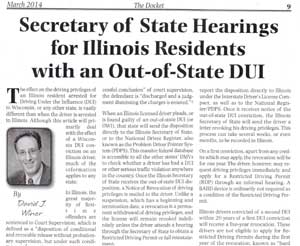Illinois Residents with Out-of-State DUI
 Secretary of State Hearings for Illinois Residents with an Out-of-State DUI by David J. Winer
Secretary of State Hearings for Illinois Residents with an Out-of-State DUI by David J. Winer
The effect on the driving privileges of an Illinois resident arrested for Driving Under the Influence (DUI) in Wisconsin, or any other another state, is vastly different than being arrested in Illinois. Although, this article will primarily deal with Wisconsin DUI’s much of the information applies to any state.
In Illinois, the great majority of first offenders receive Court Supervision which is defined as “A disposition of conditional and revocable release without probationary supervision, but under such conditions and reporting requirements as are imposed by the court, at the successful conclusion of which disposition the Defendant is discharged and a judgment dismissing the charges is entered.” ( 730 ILCS 5/5-1-21) For first offenders who receive Court Supervision, a six month Summary Suspension is imposed for a .08BAC or higher and twelve months for a refusal. Provided their driving privileges are otherwise valid, once that suspension lapses, the driver automatically gets his driving privileges reinstated after paying a $250.00 reinstatement fee. During the suspension a permit is available through the mail pursuant to the MDDP program. Following the payment of the required fee and installation of a BAIID device, with the exception of the first 30 days of the suspension, the driver can drive 24/7 until the suspension ends.
When an Illinois licensed driver pleads or is found guilty of an out of state DUI (or OWI), that state will send the disposition either directly to the Illinois SOS and/or to the National Registry also known as the Problem Driver Point System/PDPS. (This massive federal database is accessible by all the other state’s DMV to check whether a driver has had a DUI or other serious traffic violation anywhere in the country) Once the Illinois SOS receives the out of state DUI disposition a Notice of Revocation will be mailed to the driver. Unlike a Suspension, which has a beginning and termination date, a revocation is a permanent withdrawal of driving privileges and the license will remain revoked forever unless the driver attends a hearing at the SOS to obtain a Restricted Driving Permit or full reinstatement.
In some states, there are different types of DUI dispositions available. In Wisconsin, one type is a plea to the DUI charge and the other is a plea to the “Refusal” charge. Some states, like Michigan, have two separate types of DUI charges of an “intoxicated” driver and another for an “impaired” driver. In the later states, when either type of DUI is sent to Illinois, it is considered a DUI conviction and a revocation will follow. Whereas, in Wisconsin a plea to a “Refusal” has very different consequences as discussed below.
A PLEA OR GUILTY FINDING ON THE “DUI” CHARGE
If an Illinois driver is convicted of a DUI in any state they are mandated to report the disposition directly to Illinois in compliance with the Interstate Drivers License Compact and to the National Registry/PDPS. Upon receipt of the disposition of the out-of-state DUI conviction, the Illinois SOS will send the driver a letter revoking their driving privileges. This process can take several weeks or even months to be recorded in Illinois.
On a first conviction, aside from any credits that may apply, the revocation will be for one year. However, the driver may request driving privileges immediately and apply for a Restricted Driving Permit through an Informal Hearing and then full reinstatement after one year. A BAIID device is ordinarily not required with the Restricted Driving Permit.
A second DUI conviction on an Illinois driving record, within 20 years of a first DUI conviction, will result in a five year revocation. During the first year of the revocation, they are not eligible to apply for a Restricted Driving Permit in a period known as “hard time.” After one year they can apply for a Restricted Driving Permit but must wait five years to request full reinstatement. A Formal Hearing is needed and the BAIID device will be required.
A third conviction on an Illinois driving record leads to a 10-year revocation and similar to a second conviction the first year is hard time with no eligibility for a Restricted Driving Permit. A Formal Hearing is needed and the BAIID device will be required.
A fourth conviction from any state, results in a lifetime revocation with no driving relief eligibility if one of those convictions took place after January 1, 1999. Convictions from any state, even if not reported Illinois are counted in determining whether a lifetime ban is imposed. This usually arises when an out of state DUI is located through the National Registry although it did not appear on the Illinois driving record.
Drivers under 21 when convicted of a first DUI offense suffer more severe consequences. The revocation period is two years and the first year is hard time.
A driver who is eligible for a Restricted Driving Permit (RDP) can request the permit for employment, school, support group meetings, medical appointments for themselves or an immediate family member, court ordered public service, family education and a child’s day care. However, if the RDP hearing is conducted prior to the revocation eligibility date an “Undue Hardship” must be shown. To prove an undue hardship the petitioner must present evidence of a lack of alternative transportation, such as public transportation, rides from others, walking, etc. In addition, the lack of transportation must poses a serious threat to their employment, threaten advancement, income or to fulfill the other above needs of a permit.
A PLEA TO THE “REFUSAL” CHARGE
In Wisconsin, an Illinois driver who did not take the BAC test may sometimes enter a plea to the “Refusal” charge. This type of disposition does not exist in Illinois. While a plea or finding of guilty to the DUI will result in a revocation, a plea to the “Refusal” will result in a one year suspension in Illinois. Unlike a revocation, the Refusal suspension will end after the one year period and the driver may petition the Illinois SOS for an RDP during the suspension. Sometimes a Refusal suspension will be sent to Illinois prior to the case being disposed of in Wisconsin. It will appear on the Illinois abstract as an “03- Out of State Refusal Suspension”
Ordinarily in Wisconsin the Refusal charge is dismissed for a guilty plea to the DUI charge. However, if the prosecutor is made aware of the severe consequences for an Illinois first offender, they will sometimes negotiate a plea to the “Refusal” and dismiss the DUI charge.
In Wisconsin courts, a driver charged with a Refusal can contest the suspension at a pre-trial hearing similar to an Illinois Petition to Rescind. The hearing determines whether the officer was legally entitled to request a BAC test of the Defendant. Like Illinois, the issues at a refusal hearing, include whether the officer was entitled to stop the driver, was there probable cause for an arrest, was the driver properly informed under the Implied Consent Law and whether they actually refused.
Hence, an Illinois driver benefits from accepting a plea to a Wisconsin Refusal rather than the DUI (or OWI). If the driver is subsequently convicted of the DUI charge, then the length of the implied consent suspension already served may be credited against the period of revocation imposed once the notice of revocation is issued by the Illinois Secretary of State.
Whether or not the driver obtains an RDP in Illinois once the suspension period is over a reinstatement fee must be paid and the license will become valid. Importantly, a Refusal charge on an Illinois driving abstract will not preclude the driver from obtaining Court Supervision on a future DUI in Illinois.
CONSEQUENCES IN WISCONSIN
Following an arrest for DUI (Called an OWI in Wisconsin), an Illinois driver will be assigned a Wisconsin driver’s license number. If the driver had a BAC at .08 or higher, an “administrative suspension” will go into effect in Wisconsin for a term of 6 months. This suspension begins 30 days after the breath or blood test result are received and will only apply to driving in the State of Wisconsin. If the driver is ultimately convicted in court of a first offense DUI the court will impose a “revocation” between 6-9 months. The length of the revocation period will depend on how high the Breathalyzer reading was and will be part of the negotiated plea between the prosecutor and the defense counsel. The driver will be credited any time he was administratively suspended against the final revocation ordered by the court. If the driver is convicted of having a BAC at .15 or higher, the court will order an ignition interlock device be installed for one year. If a driver is convicted of a Refusal to take the chemical test, there will be a mandatory one year revocation imposed and the driver will be ordered to install a ignition interlock device for 1 year.
To lift the revocation and clear the driver’s status after the revocation period, an Illinois driver must pay a $200.00 reinstatement fee to the Wisconsin DMV. The driver must also submit documentation of an alcohol assessment/evaluation which can be done in the State of Illinois. Within one year, the driver must provide proof that he completed the recommended hours of treatment. If proof of completion is not timely filed, another revocation for non-compliance will go into effect.
An Illinois driver that travels to Wisconsin must be aware of these consequences as there is no RDP available for a non-Wisconsin resident during the suspension. It is advisable that an Illinois driver retain an experienced Wisconsin DUI attorney and be aware of any these and other ramifications and requirements. Although the Illinois driver may obtain an RDP or reinstatement in Illinois, if the above requirements are not met their license will be suspended in Wisconsin even though they are valid to drive in Illinois and every other state.
THE HEARING PROCESS
To obtain an RDP or reinstatement the driver must attend an Informal or Formal Secretary of State hearing. A first conviction in Illinois for an out of state DUI, with no prior Illinois Summary Suspensions, the driver is eligible for an Informal hearing at a local SOS facility. If the driver has a prior DUI supervision, conviction or a Summary Suspension a Formal hearing in required. Both types of hearings require compliance of an alcohol evaluation, treatment completion and several other requirements.
It is advisable that an Illinois attorney be involved at an early stage while the out-of-state case is pending. The out of state attorney must understand the ramifications in Illinois and use that in negotiations to the clients benefit. Also, while the case is pending the attorney should immediately request permission to obtain an alcohol evaluation and complete treatment in Illinois. These documents can be used to satisfy the court’s requirements, and then later for the Illinois SOS hearing. The out-of-state lawyer should consult with an Illinois lawyer to coordinate the court and subsequent SOS proceedings. The ideal situation is that, prior to the disposition of the case, the driver completes an Illinois evaluation and treatment. Once the suspension or revocation appears in Illinois, they can immediately request a hearing.
The only way for an Illinois driver to avoid a revocation for an out of state DUI conviction is an acquittal, dismissal, a reduction to a lesser charge or a plea to the Refusal charge. In the case of a refusal the only way to avoid a out of state refusal suspension is to win both the refusal hearing and accompanying DUI charge.
David J. Winer, a partner at the Law Offices of Winer & Winer with offices in Waukegan and Skokie. They concentrate in Secretary of State hearings, DUI/Traffic law and Criminal Defense.
